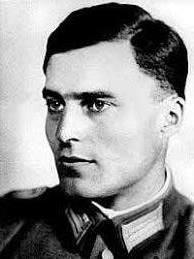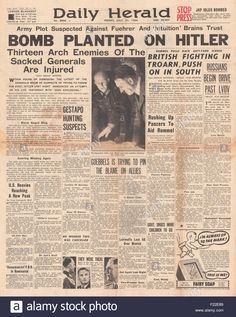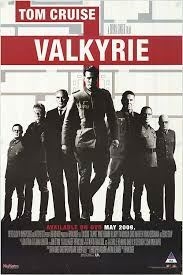Es lebe das heilige Deutschland!
 Early photo of Stauffenberg wikipedia.orgMore than 80 years ago, life in Germany began to fall under the tyranny of Hitler. The people of Germany and the non-Aryan race desperately needed a saving grace. Claus Von Stauffenberg, a noble being, excelled at the things he did ranging from academics to athletics. Stauffenberg was born in the Castle of Jettingten in the year of 1907. His family’s relationship with the German Army made him well-involved in that status. At the age of 19, he joined the Seventeenth Cavalry Regiment and as time passed by, his rank in the army greatly increased. During an operation in North Africa, Stauffenberg faced multiple injuries losing his right hand, left eye, and two fingers on his left hand leaving him permanently disfigured. With more power as a higher rank, he resisted against cruelty and torture in hopes to restore sacred Germany. His true passion for his country and people were displayed through his heroic actions against evil. A high ranked and well respected Colonel, Claus Philipp Maria Schenk Graf Von Stauffenberg utilized his selflessness and bravery to help the German people for the greater good.
Early photo of Stauffenberg wikipedia.orgMore than 80 years ago, life in Germany began to fall under the tyranny of Hitler. The people of Germany and the non-Aryan race desperately needed a saving grace. Claus Von Stauffenberg, a noble being, excelled at the things he did ranging from academics to athletics. Stauffenberg was born in the Castle of Jettingten in the year of 1907. His family’s relationship with the German Army made him well-involved in that status. At the age of 19, he joined the Seventeenth Cavalry Regiment and as time passed by, his rank in the army greatly increased. During an operation in North Africa, Stauffenberg faced multiple injuries losing his right hand, left eye, and two fingers on his left hand leaving him permanently disfigured. With more power as a higher rank, he resisted against cruelty and torture in hopes to restore sacred Germany. His true passion for his country and people were displayed through his heroic actions against evil. A high ranked and well respected Colonel, Claus Philipp Maria Schenk Graf Von Stauffenberg utilized his selflessness and bravery to help the German people for the greater good.
Since the beginning of Claus’ Army career, he was a selfless person with great intention. When Hitler arose with power and evil, Stauffenberg knew he must do what was right: “He was impelled to do so by complex motives in which honour, both personal and national, played its part. He wanted to restore the Army to its proper place at the heart of the German nation” (Ramsay). Stauffenberg’s reasons involved both his country and himself, which fueled him to resist for justice. He wanted better for the people, so he had to rebuild the Army which shows he thought of millions of others before himself. For such a high position in the Army, putting people before himself was now the norm, or a professional courtesy. Motivated by those two reasons, his intentions for a better Germany Army displayed selflessness. When the plan to resist Hitler began to conspire, “Stauffenberg ultimately hoped a social democratic government would be formed after the Nazi regime was removed” (“Claus Von Stauffenberg” ). He was aware of the torturing and evil done by Hitler and the Nazis, so he fought with the intent to make a safer, more just economy after his plan went through. A social democratic government is an ideology that supports economic and social involvement to promote social justice, which is far more preferred than an dictated anti-Semitic government. Different from most, Stauffenberg resisted not for reasons that would only benefit himself, but for German people and the bigger picture. Resisting one of the most powerful dictators in the history of the world was something a majority of people couldn’t even imagine. Fortunately, Stauffenberg’s selflessness fueled him to do so
 Newspaper released after assassination attempt towards Hitlerpinterest.comClaus held a rare type of heroic trait inside him, one that was present in very few individuals throughout the ages. His bravery was especially evident when he went through the main parts of the assassination. When Stauffenberg’s true character came to a test, the bravery within him didn’t back down. “The cards were stacked against Stauffenberg from the beginning. A more prudent man would have acknowledged this and withdrawn. It is ironical that Stauffenberg was not at first considered as a suitable assassin because of the handicap of his war wounds and also because he was considered indispensable to the smooth running of the new administration that would take over,[...]”. (Ramsay). Even with low odds and various disabilities and disfigurements, Stauffenberg exemplified his fearless personality by overcoming physical and power-wise obstacles when there were high chances of death and low chances of success. The average everyday German at that time wouldn’t consider doing anything similar to what Claus had done. Stauffenberg had no problem resisting powerful dictation despite his hardships. After the initial attempt to remove Hitler revealed numerous flaws and holes, “[...]Stauffenberg reported the absence of Himmler and Luftwaffe Air Marshal Hermann Goering from the briefing session and was subsequently ordered by senior conspirators in Berlin to abort the assassination attempt. Nevertheless, he secretly agreed with close friend and co-conspirator Colonel Albrecht von Mertz to try to kill Hitler anyway, but when he returned to the briefing room, he discovered the session had ended after only five minutes” (Hoffmann). Even when the odds were against him, Stauffenberg pushed through and continued to carry out his plan in crucial moments. Bravery pushed him to keep attempting to kill Hitler no matter what. When Stauffenberg had found his way inside the conference room, his only goals were to eliminate the country’s biggest threat. Claus stood out from everyone else, his behavior was quite courageous and he had escaped from the tight grasp of fear.
Newspaper released after assassination attempt towards Hitlerpinterest.comClaus held a rare type of heroic trait inside him, one that was present in very few individuals throughout the ages. His bravery was especially evident when he went through the main parts of the assassination. When Stauffenberg’s true character came to a test, the bravery within him didn’t back down. “The cards were stacked against Stauffenberg from the beginning. A more prudent man would have acknowledged this and withdrawn. It is ironical that Stauffenberg was not at first considered as a suitable assassin because of the handicap of his war wounds and also because he was considered indispensable to the smooth running of the new administration that would take over,[...]”. (Ramsay). Even with low odds and various disabilities and disfigurements, Stauffenberg exemplified his fearless personality by overcoming physical and power-wise obstacles when there were high chances of death and low chances of success. The average everyday German at that time wouldn’t consider doing anything similar to what Claus had done. Stauffenberg had no problem resisting powerful dictation despite his hardships. After the initial attempt to remove Hitler revealed numerous flaws and holes, “[...]Stauffenberg reported the absence of Himmler and Luftwaffe Air Marshal Hermann Goering from the briefing session and was subsequently ordered by senior conspirators in Berlin to abort the assassination attempt. Nevertheless, he secretly agreed with close friend and co-conspirator Colonel Albrecht von Mertz to try to kill Hitler anyway, but when he returned to the briefing room, he discovered the session had ended after only five minutes” (Hoffmann). Even when the odds were against him, Stauffenberg pushed through and continued to carry out his plan in crucial moments. Bravery pushed him to keep attempting to kill Hitler no matter what. When Stauffenberg had found his way inside the conference room, his only goals were to eliminate the country’s biggest threat. Claus stood out from everyone else, his behavior was quite courageous and he had escaped from the tight grasp of fear.
 2008 film surrounded Stauffenberg's famous assassination plotallaboutwarmovies.comFrom German Cadet to Colonel, Claus Von Stauffenberg remained the selfless and brave person he always was, using his special traits to help Germany and its people. Stauffenberg wanted a better place for all of Germany and its people. A just and fair democracy was what Claus had hoped for. He did what he had to do, even if it meant sacrificing himself to know that one day, everything would be all right. The main man in the famous plot, it made him quite the center of attention. Claus inspires others to charge with bravery, fearless in the action, helping others with good intentions before thinking of yourself. His inspiration on the world after his death focused on actions filled with courage and free from the sole purpose of self-benefit. Although his life was cut short by a firing squad, his legacy lives on. Though his body lay dead, his love for Germany stands upright and lives forever.
2008 film surrounded Stauffenberg's famous assassination plotallaboutwarmovies.comFrom German Cadet to Colonel, Claus Von Stauffenberg remained the selfless and brave person he always was, using his special traits to help Germany and its people. Stauffenberg wanted a better place for all of Germany and its people. A just and fair democracy was what Claus had hoped for. He did what he had to do, even if it meant sacrificing himself to know that one day, everything would be all right. The main man in the famous plot, it made him quite the center of attention. Claus inspires others to charge with bravery, fearless in the action, helping others with good intentions before thinking of yourself. His inspiration on the world after his death focused on actions filled with courage and free from the sole purpose of self-benefit. Although his life was cut short by a firing squad, his legacy lives on. Though his body lay dead, his love for Germany stands upright and lives forever.
Works Cited
"Claus Von Stauffenberg." Encyclopedia of World Biography, vol. 35, Gale, 2015. Biography In Context, https://link.galegroup.com/apps/doc/K1631010361/BIC?u=powa9245&sid=BIC&xid=81e6ccf0. Accessed 9 May 2018.
Hoffmann, Peter. “Claus Von Stauffenberg.” Claus Von Stauffenberg, 2003, www.jewishvirtuallibrary.org/claus-von-stauffenberg.
Ramsay, Allan. "Claus von Stauffenberg and the German Officers' Plot of 1944." Contemporary Review, Nov. 2004, p. 275+. Biography In Context, https://link.galegroup.com/apps/doc/A126613530/BIC?u=powa9245&sid=BIC&xid=14df8a81. Accessed 10 May 2018.
Page created on 5/24/2018 6:34:14 PM
Last edited 5/28/2018 3:41:35 PM
